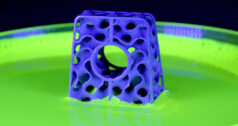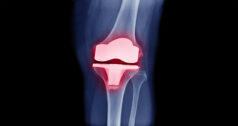Twelve years after implanting its MP-1 polymer into humans in clinical trials, M.M.A. Tech recently saw adoption of its material during a hip and knee replacement at Rambam Medical Center in its home country of Israel.
MP-1 was originally designed for jet bearings as a substitute for steel, and used by NASA. Orthopaedics has taken cues from the aerospace industry in the past, and with new materials often cited as a driver for future orthopaedic innovation, the update on more implantations of MP-1 is of interest to industry.
M.M.A Tech claims that the material offers a longer implant lifespan, less wear debris and greater flexibility in design. The properties have led the company to use the material in hip liners, tibial components, intramedullary nails and screws and dental implants.
We asked Alisa Buchman, Chief Technology Officer of M.M.A. Tech and developer of MP-1, to describe production and properties of the material.
“MP-1 is a pure Polyimide polymer produced from four monomers to create a powder. This powder is compression molded into a block or to a near-net-shape product. This is machined into the final medical device.
“This is the most advanced polymer that exists today. It is fully aromatic and 97% cross-linked, which exhibits very high strength and thermal resistance. This material can withstand temperatures up to 400° C in constant use or 700° C to 900° C in short exposure with no damage. This property causes the material to have no creep, fatigue or dimensional changes at body temperature. The MP-1 also has no wear or fatigue and is self-lubricating, as the more the material moves, the smoother it gets. The very few particles generated in a 5 million cycle hip simulator were all larger than 2 microns, a size that macrophage can’t swallow, meaning that there will be no infection.
“The MP-1 material is biocompatible and totally inert. It is also radiopaque, so it can be seen in x-ray scanning, which enables a better follow-up. It is very strong, but also partly ductile and thus not brittle (compared to ceramic). This property enables the use of MP-1 in small bones and enables producing thin acetabular liners with better range of motion.
MP-1 is highly durable and can withstand dynamic motion for more than 30 years in the body.”
M.M.A. Tech is pursuing clinical trials. It received a CE Mark for an acetabular liner and has submitted a Master File to FDA. Following the trend of other companies with unique materials or devices, upon finalizing clinical trials and receiving market access, M.M.A. Tech. plans to become a supplier to device companies and not an OEM to hospitals, Buchman says. The company is currently developing its production procedure to mold net shape designs and manufacture on a large scale.
In 2017, M.M.A. Tech received more than $1.6 million as part of the European Commission’s HORIZON 2020 Grant.
CL
Carolyn LaWell is ORTHOWORLD's Chief Content Officer. She joined ORTHOWORLD in 2012 to oversee its editorial and industry education. She previously served in editor roles at B2B magazines and newspapers.




